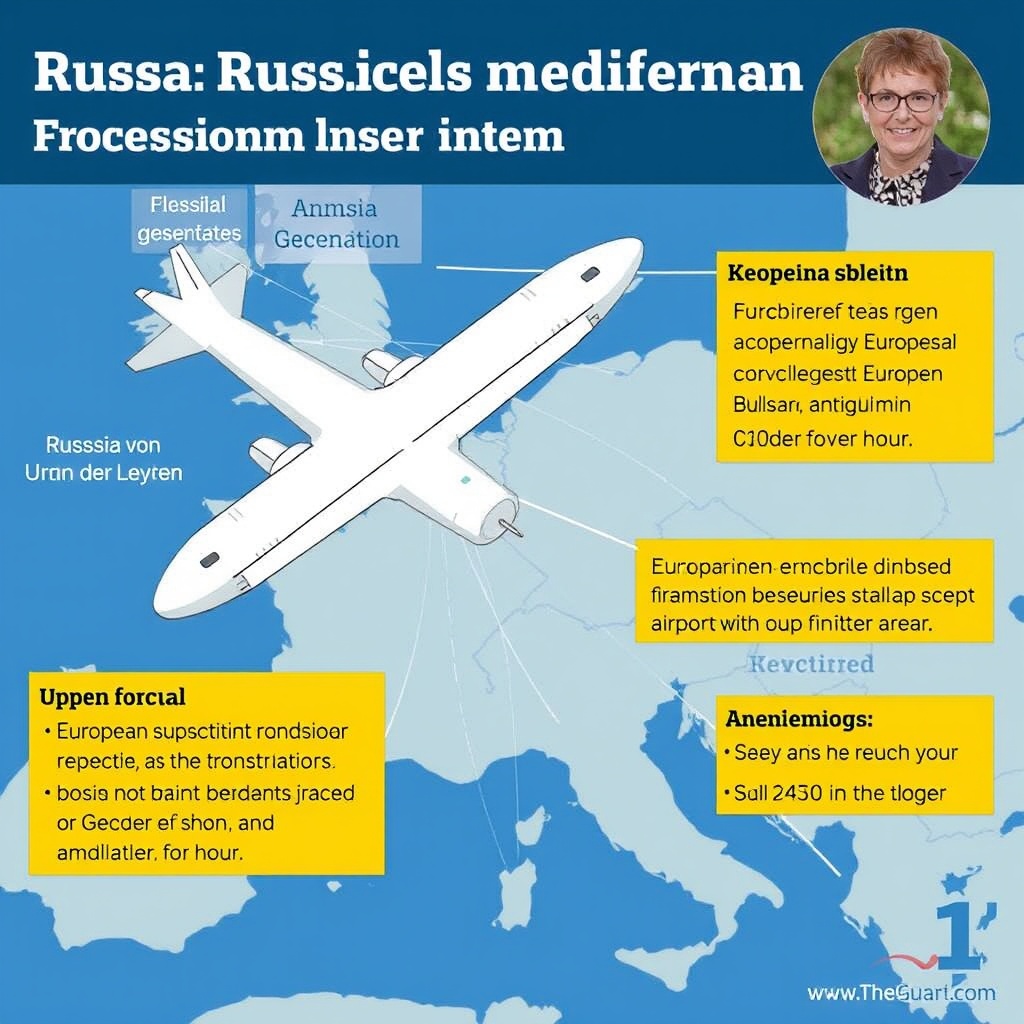Introduction
The world of international relations and cybersecurity has been abuzz with the recent news of Russia being suspected of jamming the GPS signals of a plane carrying Ursula von der Leyen, the President of the European Commission. This incident, which reportedly forced the aircraft to circle a Bulgarian airport for an hour, raises significant concerns about the safety and security of air travel, as well as the escalating tensions between Russia and the European Union. In this article, we will delve into the details of this incident, explore the implications of GPS jamming, and examine the broader context of Russia's suspected involvement in such activities.
The Incident: A Closer Look
On September 1, 2025, a plane carrying Ursula von der Leyen was reportedly subject to GPS jamming, forcing the aircraft to circle Sofia Airport in Bulgaria for approximately an hour. The incident has been attributed to Russia, although the country has not officially commented on the matter. The use of GPS jamming technology can have severe consequences for air travel, including disrupting navigation systems, communication equipment, and even the aircraft's ability to land safely. In this case, the plane was eventually able to land without incident, but the event highlights the potential risks and vulnerabilities associated with GPS jamming.
The incident has sparked outrage and concern among EU officials, with many calling for a thorough investigation into the matter. The European Commission has stated that it is taking the incident seriously and is working closely with Bulgarian authorities to determine the cause of the GPS jamming. Meanwhile, Russia has remained tight-lipped about the incident, fueling speculation about its potential involvement.
The Implications of GPS Jamming
GPS jamming is a form of electronic warfare that involves disrupting or interfering with GPS signals, which are used for navigation, communication, and other purposes. The technology is relatively simple and inexpensive to deploy, making it a attractive option for countries or organizations seeking to disrupt the operations of their adversaries. However, GPS jamming can have far-reaching consequences, including:
- Disrupting air travel: As seen in the incident involving Ursula von der Leyen's plane, GPS jamming can force aircraft to alter their flight plans, potentially leading to delays, diversions, or even accidents.
- Interfering with critical infrastructure: GPS signals are used to synchronize clocks and systems in critical infrastructure, such as power grids, financial networks, and transportation systems. Disrupting these signals can have significant consequences for the functioning of these systems.
- Compromising national security: GPS jamming can be used to disrupt the navigation and communication systems of military aircraft, ships, and other vehicles, potentially compromising national security.
The use of GPS jamming technology is not new, and it has been employed by various countries and organizations in the past. However, the incident involving Ursula von der Leyen's plane highlights the potential risks and vulnerabilities associated with this technology, particularly in the context of international relations and cybersecurity.
Russia's Suspected Involvement
Russia has been suspected of involvement in several incidents of GPS jamming in recent years, including during the conflict in Ukraine. The country has also been accused of using electronic warfare tactics to disrupt the operations of its adversaries, including the use of GPS jamming technology. While Russia has not officially commented on the incident involving Ursula von der Leyen's plane, the country's suspected involvement has sparked significant concern among EU officials and cybersecurity experts.
The incident has also raised questions about the effectiveness of current measures to prevent GPS jamming and the need for more robust countermeasures to mitigate the risks associated with this technology. The EU has stated that it is working to develop new technologies and strategies to counter GPS jamming, including the use of alternative navigation systems and more secure communication protocols.
Some statistics and examples that illustrate the severity of the issue include:
- According to a report by the European Union Agency for Network and Information Security (ENISA), there were over 300 reported incidents of GPS jamming in the EU between 2015 and 2020.
- In 2018, the US Department of Transportation reported that GPS jamming had caused over 1,000 incidents of air traffic control disruptions in the United States.
- A study by the Cybersecurity and Infrastructure Security Agency (CISA) found that GPS jamming can cause significant disruptions to critical infrastructure, including power grids, financial networks, and transportation systems.
Conclusion
The incident involving Ursula von der Leyen's plane highlights the significant risks and vulnerabilities associated with GPS jamming, particularly in the context of international relations and cybersecurity. The suspected involvement of Russia in this incident has sparked significant concern among EU officials and cybersecurity experts, and raises questions about the effectiveness of current measures to prevent GPS jamming.
As the world becomes increasingly dependent on GPS technology, the need for more robust countermeasures to mitigate the risks associated with GPS jamming has never been more pressing. The development of alternative navigation systems, more secure communication protocols, and enhanced cybersecurity measures will be crucial in preventing similar incidents in the future.
In the meantime, the international community must remain vigilant and work together to address the threats posed by GPS jamming and other forms of electronic warfare. The incident involving Ursula von der Leyen's plane serves as a stark reminder of the importance of cooperation and diplomacy in preventing the misuse of technology and promoting global security and stability. As we look to the future, it is essential that we prioritize the development of more effective countermeasures and work towards a more secure and stable world for all.


Leave a comment